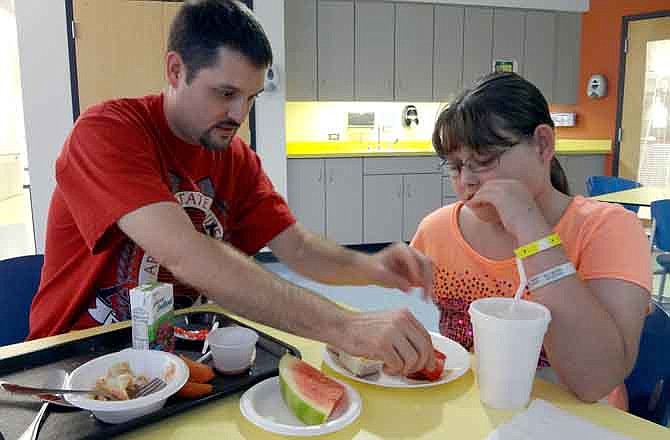MARYLAND HEIGHTS, Mo. (AP) - When children with severe injuries and illnesses go home from the hospital, their parents and caregivers step into the role of doctors and nurses.
At Ranken Jordan Pediatric Specialty Hospital in Maryland Heights, parents learn how to change and suction breathing and feeding tubes. They train in CPR. They know what to do if the power goes out and their child breathes through a ventilator.
"We have to get them ready for whatever they're going to go through at home," said Lisa Monteleone, the hospital's director of care coordination. "We're caring for the parent as much as we're caring for the child."
Sometimes the parents have their own challenges. One mother had difficulty with reading, so Ranken Jordan staff created a book with 25 pictures as a step-by-step guide to care for her child's breathing tube.
The hospital takes patients and their caregivers on field trips to baseball games and groceries. The idea is to have fun, but also to show parents that their children don't have to be homebound.
The average patient stays for 47 days at Ranken Jordan, where children are referred after being treated for traumatic brain injuries, birth defects and serious illnesses. Children and parents receive psychological counseling as well as therapies to help them go back home.
Training parents to recognize and attend to their children's needs can reduce the need for emergency room visits, Monteleone said.
Angela Conners of East St. Louis feels ready to take care of her 4-year-old daughter, Ashauntae Jones, who is scheduled for discharge soon.
Conners received weekly training on how to care for her daughter, who has cerebral palsy and uses a feeding tube.
"They're making it really easy for me to transition home," Conners said. "I'm a single parent so I need all the help I can get."
Conners became so involved in her daughter's care that she graduated as a licensed practical nurse in April.
"I wanted to better understand what was going on with her and how to help her," said Conners, who works in a nursing home in Illinois.
The kids learn how to return to their lives at home, too. Makenna Rodery, 10, is re-learning how to tie her shoes, fasten buttons and cut her food. Her right arm had to be amputated after she was in a car crash in July. She hopes to be back to school in Oklahoma soon.
"I'm learning how to take care of myself with one arm," she said.
Matthew Rodery said his daughter has a strong competitive spirit and he expects to see her back on the basketball court this winter.
Information from: St. Louis Post-Dispatch, http://www.stltoday.com

